TESTING donation page
ASPDP – Energy, Water, Waste: Integrating Climate Education into Your Classroom
This course on simple sustainability and climate education offers teachers the unique opportunity to delve deeper into global environmental issues on a local level.
This six day course consists of 5 in person sessions and 1 remote session, both followed by 2.5 hours of independent asynchronous readings and projects that will be due two weeks after the final session. This course has been approved by the DOE After School Professional Development Program (ASPDP) and may be counted for three P or A+ CREDITS/45hours CTLE.
July 22 – July 27, 2024 | More Information & Register Here
Blah
NY Sun Works Partnership Info Sessions
Are you interested in bringing a NY Sun Works Hydroponic Classroom to your school? Join us for an information session to learn more about our program, hear about grants available for Hydroponic Classrooms including capital funding, and ask our team any questions you may have. Registration is now available for Zoom information sessions, please spread the word!
Thursday, Aug. 15, 2024 | 10-11 am | Register Here
Blah
Rep. Hakeem Jeffries Partners with NY Sun Works to Bring Climate Education to Coney Island Schools
Brooklyn students at select schools will be seeing a lot more green on their campuses, as one congressman joined kids at a Coney Island school to present funds for teaching students about urban farming and planting. Rep. Hakeem Jeffries was at Rachel Carson High School to present $500,000 in federal money to New York Sun Works, the organization providing the hydroponic farms to the schools.
Blah
US Secretary of Education Miguel Cardona Visits NY Sun Works Hydroponic Classroom, Sees Opportunities for Students
US Secretary of Education Miguel Cardona made the rounds in New York City on Tuesday, touting investments for teachers and students, as schools get ready for the upcoming academic year. He toured schools in Queens and Brooklyn alongside Congress members Grace Meng and Nydia Velazquez.
Blah
Brooklyn and Queens Schools Get STEM and Sustainability Curriculum Thanks to Rep. Nydia Velázquez
Congresswoman Nydia Velázquez recently presented a check worth $800,000 in funding to NY Sun Works — a New York-based nonprofit that delivers science and sustainability education through urban farming to K-12 students — to provide schools in Brooklyn and Queens with hydroponic farm technology to enhance each school’s science curriculum.
Blah
School’s Out, But Sustainability Science is Always In!
Summer is officially here, which means Farmer Scientists in schools around the city are enjoying the warm weather and some fun in the sun. While most of our labs close down while students are away, some remain open through the yearly break, with plants growing from seed to harvest as temperatures soar outdoors. We’re loud and proud about our stance that sustainability should be a year-round affair, but what does it actually take to keep a Hydroponic Classroom running for 365 days and counting?
Most of our classrooms that remain open over the summer do so to support their aquaponic tank systems, which utilize fish like Tilapia to grow plants. These systems combine nutrients produced by fish waste with plants growing above to create an almost entirely self-sufficient system! As fish keep on swimming, the plants floating above help keep waters clean for their waterborne friends. However, due to the animal component of these systems, they need a little extra TLC and can’t be left alone for long periods of time. Instead, our Grow Support Team specialists stop in regularly to keep fish happy and healthy, and ensure the system itself remains clean and fully operational. Aquaponics aside, other labs whose campuses remain open continue growing and harvesting throughout the summer for a variety of reasons including community harvests and other special programs, making full use of their cutting edge hydroponic farming technology.
One such school who has remained open for summer is the Brooklyn Urban Garden Charter School (BUGS), where students in 4th and 5th grade Summer Rising programs are diving into hydroponics thanks to a grant from the 2024 Urban Farms and Community Growers Program, which is run through the NYS Agriculture and Markets Department. As part of this program, almost 80 students are using water-based farming systems and soil-based alternatives to nearly double the school’s yield of fresh greens and veggies, maximizing the productivity of their school’s green space. They’ll also work to build a distribution pipeline of what they harvest, taking crops grown at school directly from plant to plate by sharing with community partners like Mixteca and the Center for Family Life in Sunset Park (CFLSP), who serve migrant families and asylum seekers. And finally, building on the first BUGS Harvest Festival held earlier this year, the summer farming program will help students and community members become both teachers and learners when it comes to urban farming, growing deeper roots throughout the school’s Brooklyn community.
We’re keeping the fish company, diving headfirst into hydroponic farming, and getting ready once more to reopen the rest of our labs come the start of next school year. But as we continue growing throughout the summer, climate education remains the core of our mission. Students are learning in labs, and plants are growing alongside them as they learn about the climate. Our team is growing to meet the moment and better support our community, so check out our website to learn more about current opportunities, and follow us on Instagram for more insights into what’s happening in our Hydroponic Classrooms this summer!
Blah
EPA: NY Sun Works Receives $100,000 to Support Environmental Education
Blah
Queens Chronicle: In School, Students Learn From Futuristic Greens and Machines
Blah
From Seed To Harvest: Celebrating a Year of Climate Education
Summer is almost here, with schools hosting their final hydroponic harvests and students beginning to enjoy the sunshine. As we wrap up yet another year of climate education, it’s time to look back on some of our successes, and prepare for some of the amazing things still yet to come! From our annual Youth Conference to ribbon cuttings, harvests, science expos and more, there’s so much to be excited about when it comes to sustainability science in NYC.
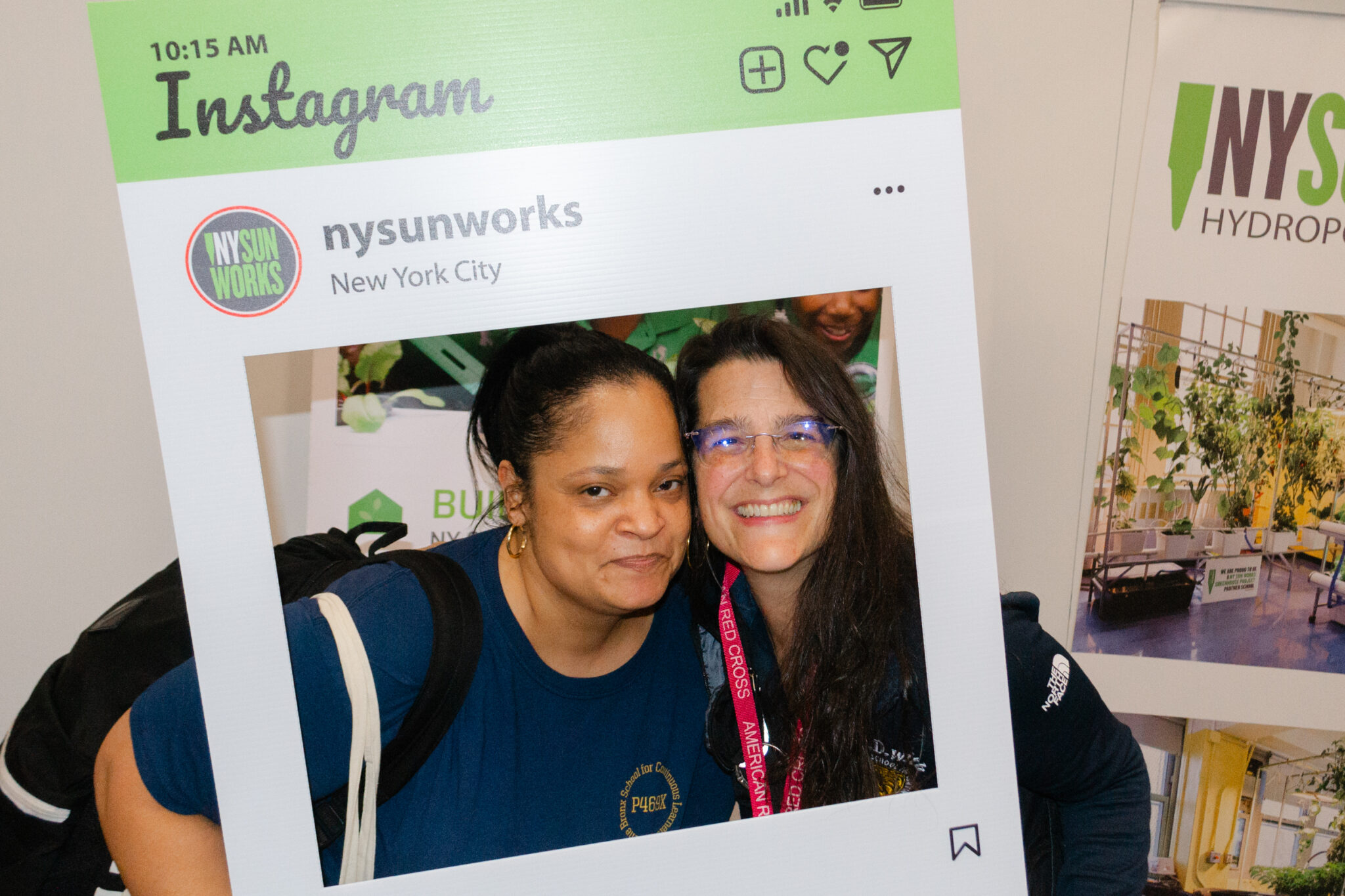
This year, we hosted our first-ever Teacher Community Carnival, where educators from our partner schools came together for an evening of chit-chat and connection at Project Farmhouse in Union Square. A high note of the celebration was awarding our first NY Sun Works Educator certificates, which signify that a teacher has completed two years of technical training, hosted a harvest, and participated in NY Sun Works professional development sessions. We also introduced our newly revamped Farming Foundations curriculum, which this year received substantial improvements with new Climate Connections, which help students understand how their actions can influence the environment.
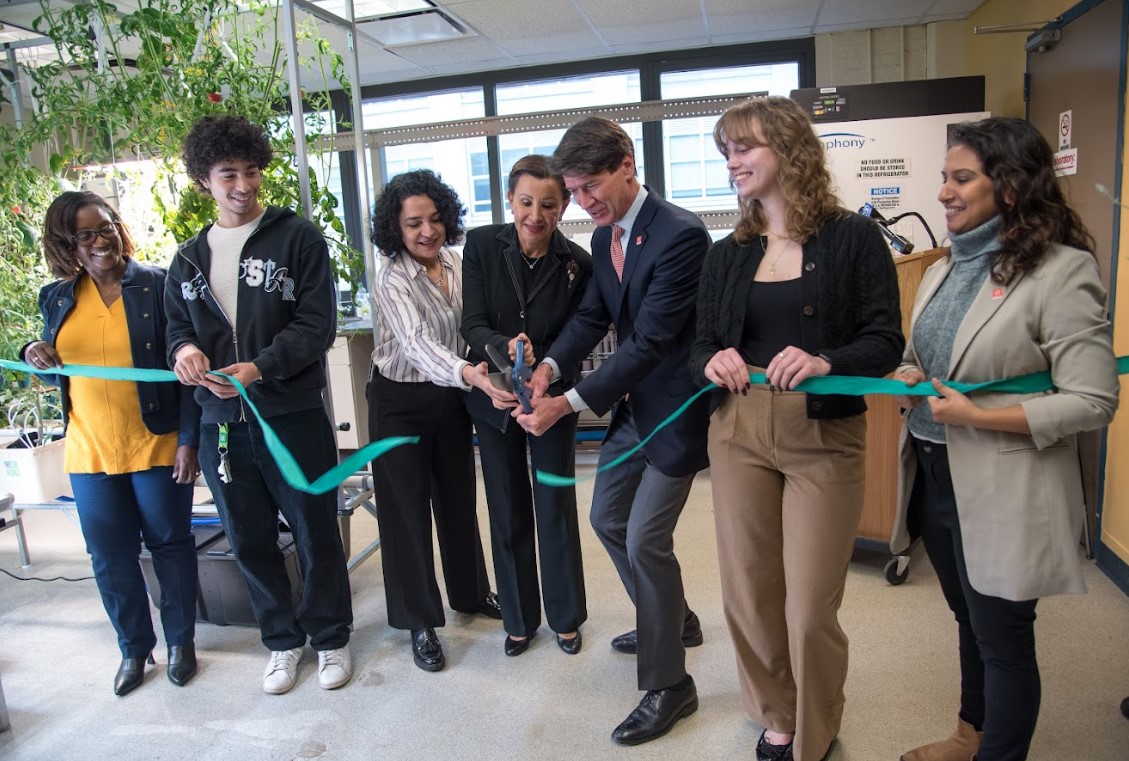
More recently, we made a wish for climate education in the new year, and thus far our wish has been granted as we plant the seeds of new partnerships around the city and welcomed nearly 100 new schools to our program! In February, we cut the ribbon at LaGuardia Community College with Representative Nydia Velázquez and University President Kenneth Adams, inaugurating one of the first post-secondary education partnerships of its kind. We also cut the ribbon on a host of other partner schools, where we look forward to growing alongside generations of young New Yorkers with sustainability in their hearts. We also launched our newly revamped website, which includes a map of all our school partners and beautiful new photos of our amazing NY Sun Works team!
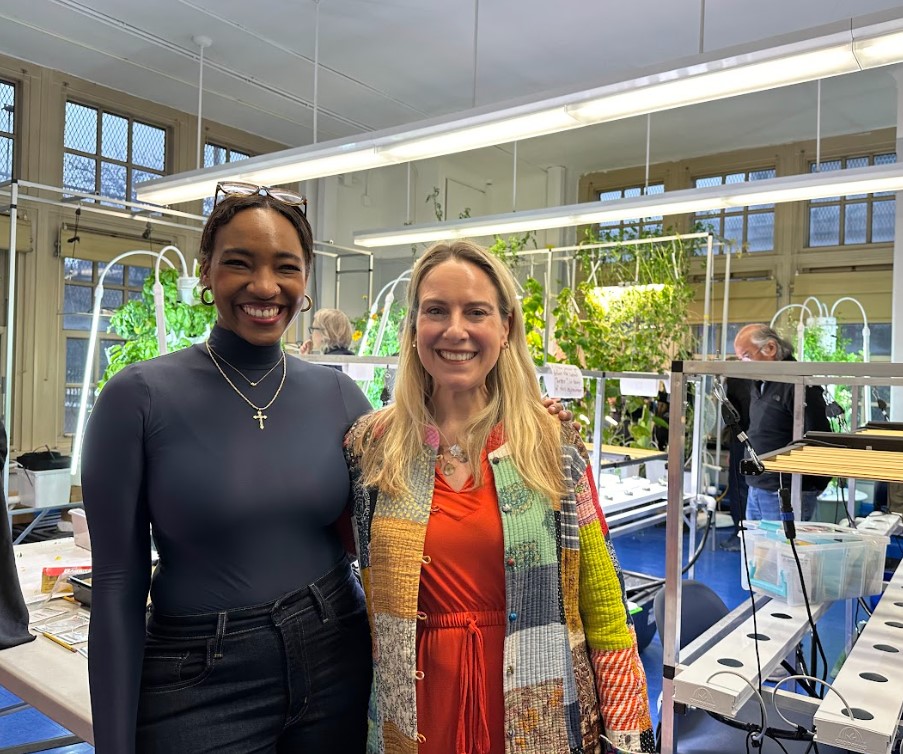
In April, we welcomed the Harvard Business School Club of NY to the High School for Climate Justice, alongside members of our Board of Directors and students at the Manhattan high school. Members of the HBSCNY got a closer look at some of the cutting edge hydroponic technology used to grow food from seed to harvest, as students showed them around and even kicked off a harvest of their own! And shortly thereafter, we began preparations for our annual Youth Conference, where almost 1,000 students and educators from the five boroughs and beyond gathered at the Javits Center to present the independent climate science research they’ve been working on in their classrooms.
All in all, it’s been a year full of teaching, learning, and growing, both for us and our students. From little victories to huge successes, it’s been a whirlwind of climate education, and we couldn’t be happier to send off the school year with a bang. Whether you want to learn more about some of these events, or missed out on the magic that made them happen, check out our Instagram for snapshots into all the sustainability science that powered us through the 2023-24 school year!
Blah
Farmer Scientists Lead the Way Toward a Greener Future at the 13th Youth Conference
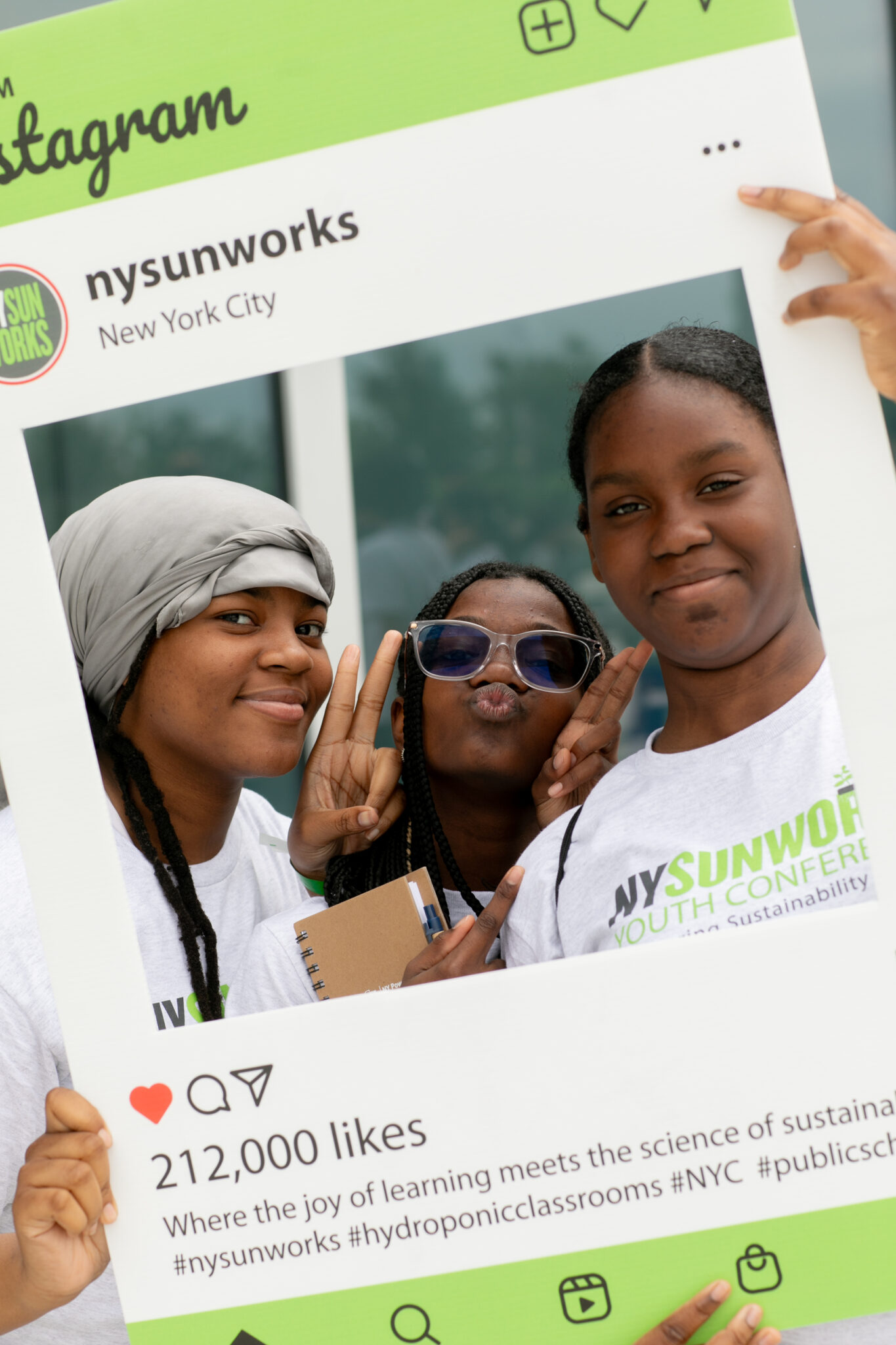
As our coverage of this year’s Youth Conference comes to a close, we wanted to shine the spotlight on those who give meaning to our mission – the students! With almost 1,000 students and educators from around the NY metro area in attendance, we were thrilled to connect with new partners, visit with long time friends, and celebrate the hard work of another generation of Farmer Scientists. Student presenters ranged from 2nd to 12th grade, with research subjects covering topics from using compost tea as a nutrient solution to the effect of water temperature on germination. We’re incredibly proud of all those who both took the stage to share, as well as those who made the journey to Javits to listen and learn!
Introducing the first session was once again Javits Center President and CEO Alan Steel, who shared his excitement about the return of the Youth Conference to the rooftop pavilion at North Javits. Steel has helped the iconic NYC convention center establish itself as a leader in the world of sustainable urban infrastructure, spearheading Javits’ successes in creating an environmentally friendly venue. Following opening remarks, presentations began with a session focused on students as Farmer Scientists, running investigations in their Hydroponic Classrooms. Using creative thinking and the scientific method, students investigated topics including the power of mushrooms, the best way to grow strawberries hydroponically, and anticancer potential of synergizing lycopene and garlic. Before the closing of this session, students also heard from Damali Wynter, the Assistant Commissioner of the NYS Department of Agriculture and Markets about how agriculture relates to all our everyday activities, and how young people can use any skill set they’re passionate about to make a difference in the world of sustainability.
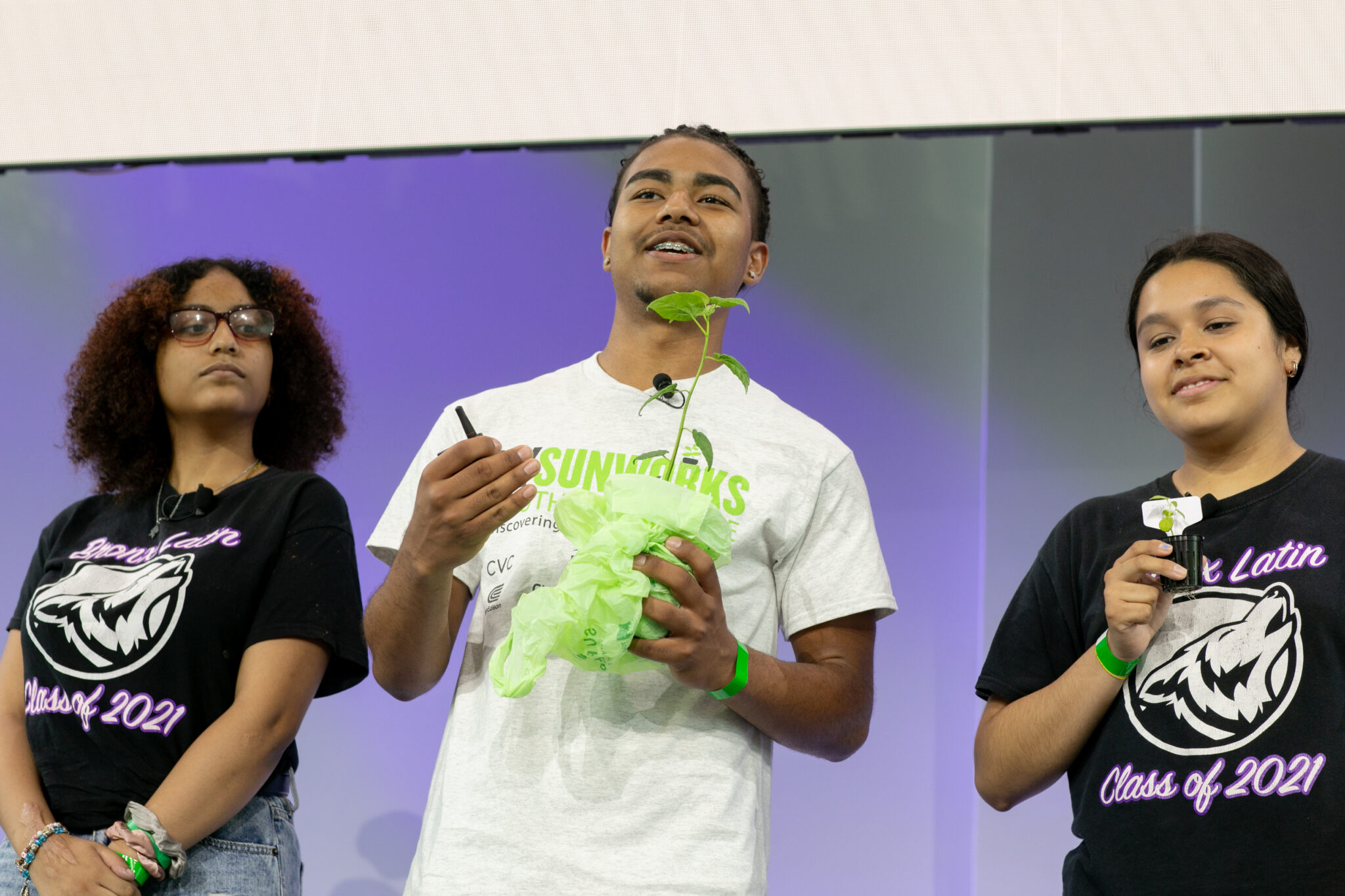
During the next session, in addition to student presenters, we were honored to hear words of support from a few of our other supporters, including US Senate Majority Leader Chuck Schumer, US Senator Kirsten Gillibrand, and US Rep. Nydia Velázquez (NY-07), who shared their excitement about our student showcase and support for quality climate education in NYC. This second session was all about students as innovators, creating their own hydroponic systems and designing solutions to current climate challenges. Research projects in this session included a hydroponic custom rescue lab intended to save plants from malfunctioning systems, as well as an automated tower system, self-sufficient irrigation systems, and a study on germination in different growing substrates.
Finally, in the third session of the morning, we heard from Daniella Piper, Executive Vice President and Chief Innovation Officer of New York Power Authority. Piper spoke to her experience growing up in an agricultural community abroad, and how that perspective shapes her approach to innovation and sustainability. Following that, students dove into the session revolving around climate action, with students acting as global citizens engaging in community events and expanding the learning beyond their Hydroponic Classrooms. A few topics that were shared included testing how decomposers like worms help soil become better for plant growth, the impacts of contaminants in tap water on urban agriculture, and the strength of healthy healing herbs. Closing this session, we also heard from US Rep. Dan Goldman (NY-10), who sent our students off with a message of sincere support.
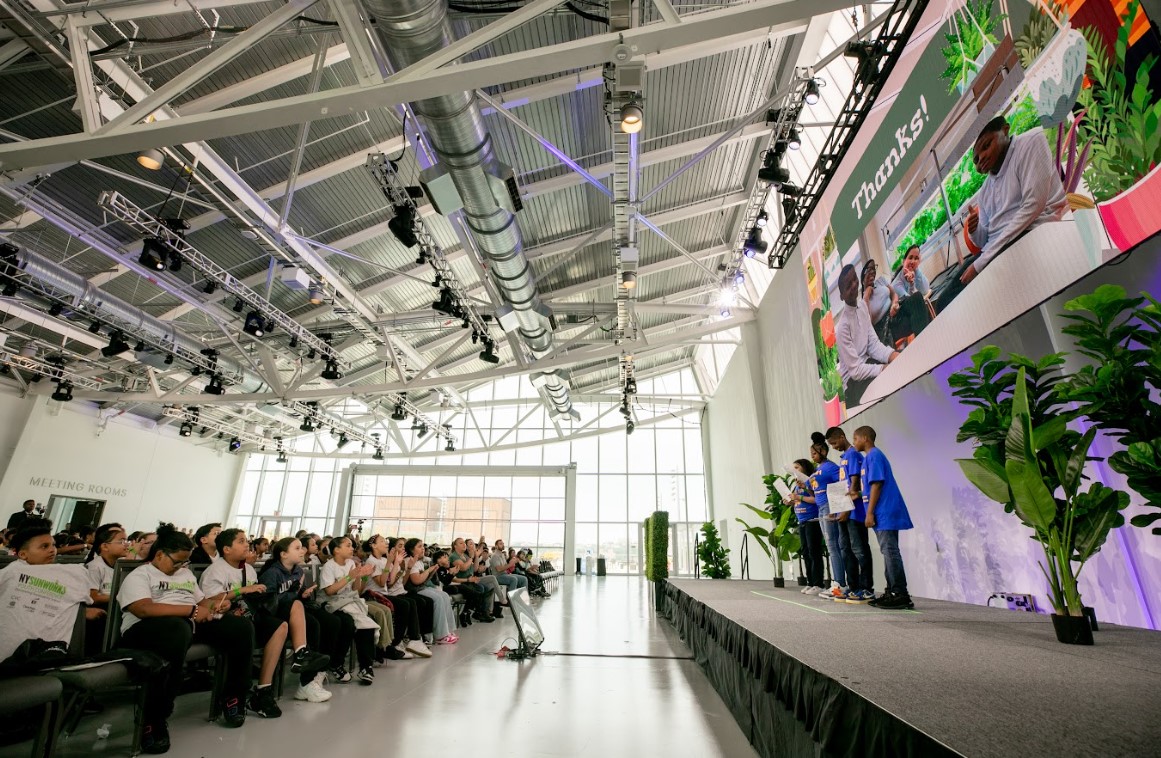
After the official close of this year’s conference presentations, we were equally excited to dive headfirst into our second-ever College and Career Fair! High school students in our Workforce Development Program had the unique opportunity to connect with a variety of organizations and universities in the realms of urban farming and sustainability, as they pursue certification in Controlled Environment Agriculture (CEA). Additionally, they met with members of the NY Sun Works Associate Board for resume and cover letter reviews, and volunteers from EY also provided mentoring in professional networking! And of course, reporting live on all the climate education was our Youth Press Team, which allowed students of nearly all grade levels to interview fellow students and guest speakers after their presentations.
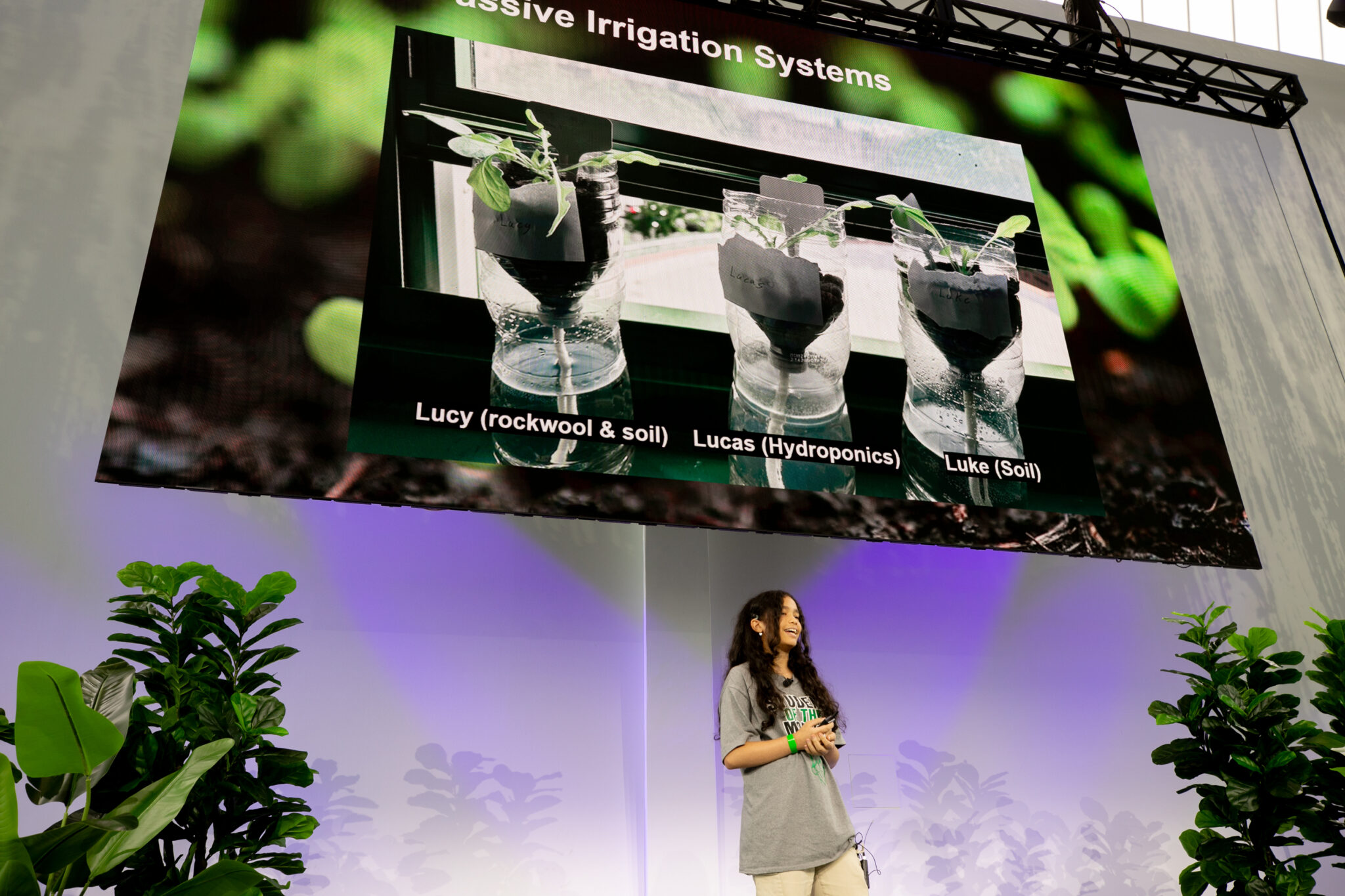
These students have truly done something worth celebrating, and we are incredibly honored to play our part in empowering so many young New Yorkers to grow a greener future. Additionally, we are thankful for the parents and families who helped prepare them for their big day, the teachers who stewarded them along the way, and all those whose passion and dedication helped the day flourish into such a success. If you’d like to watch the full conference recording or individual student presentations, check out our YouTube channel. For more information on the Youth Press Team, click here.
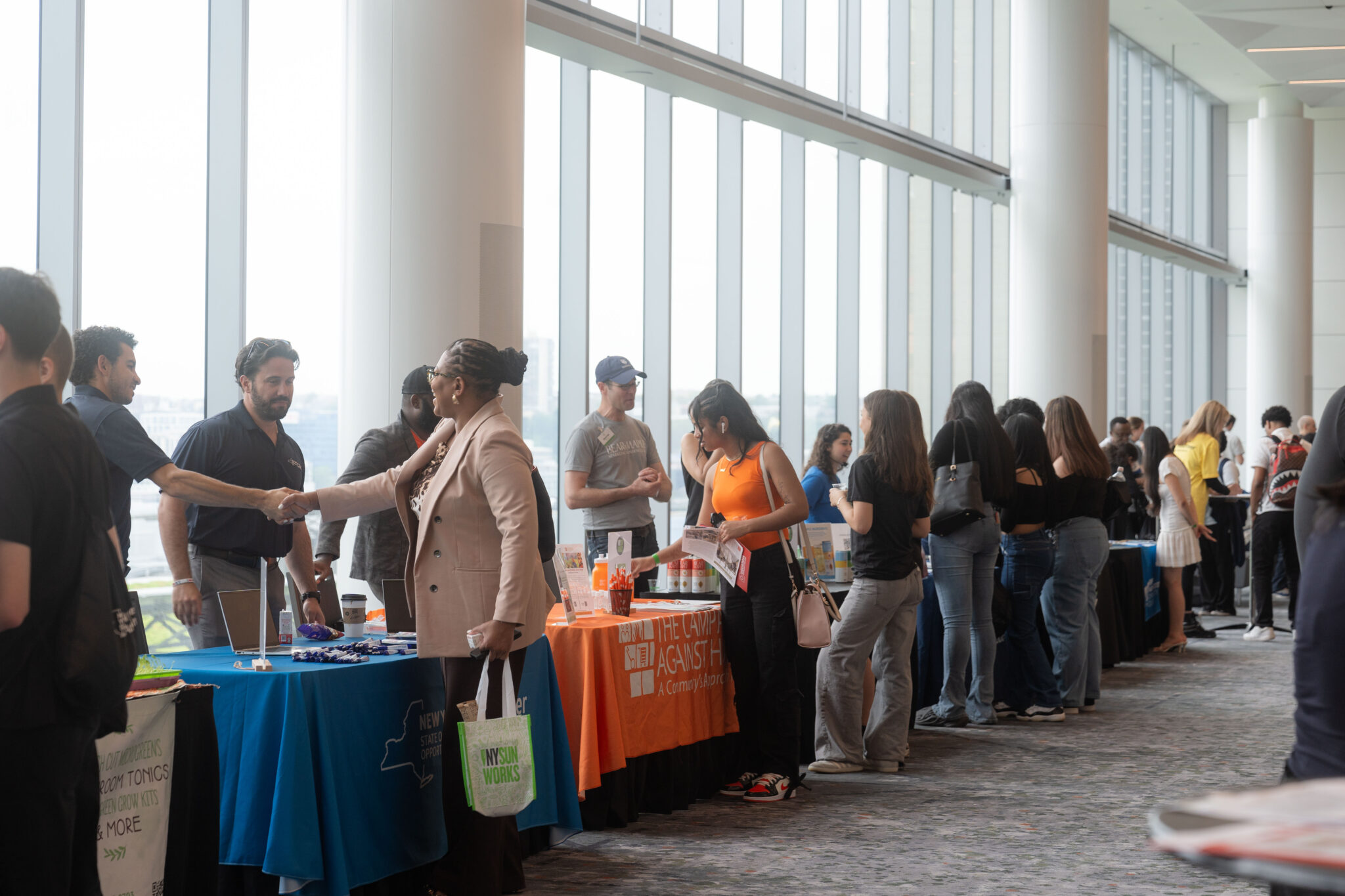
Blah
Student Journalists Ask Hard Hitting Questions at the 13th Youth Conference
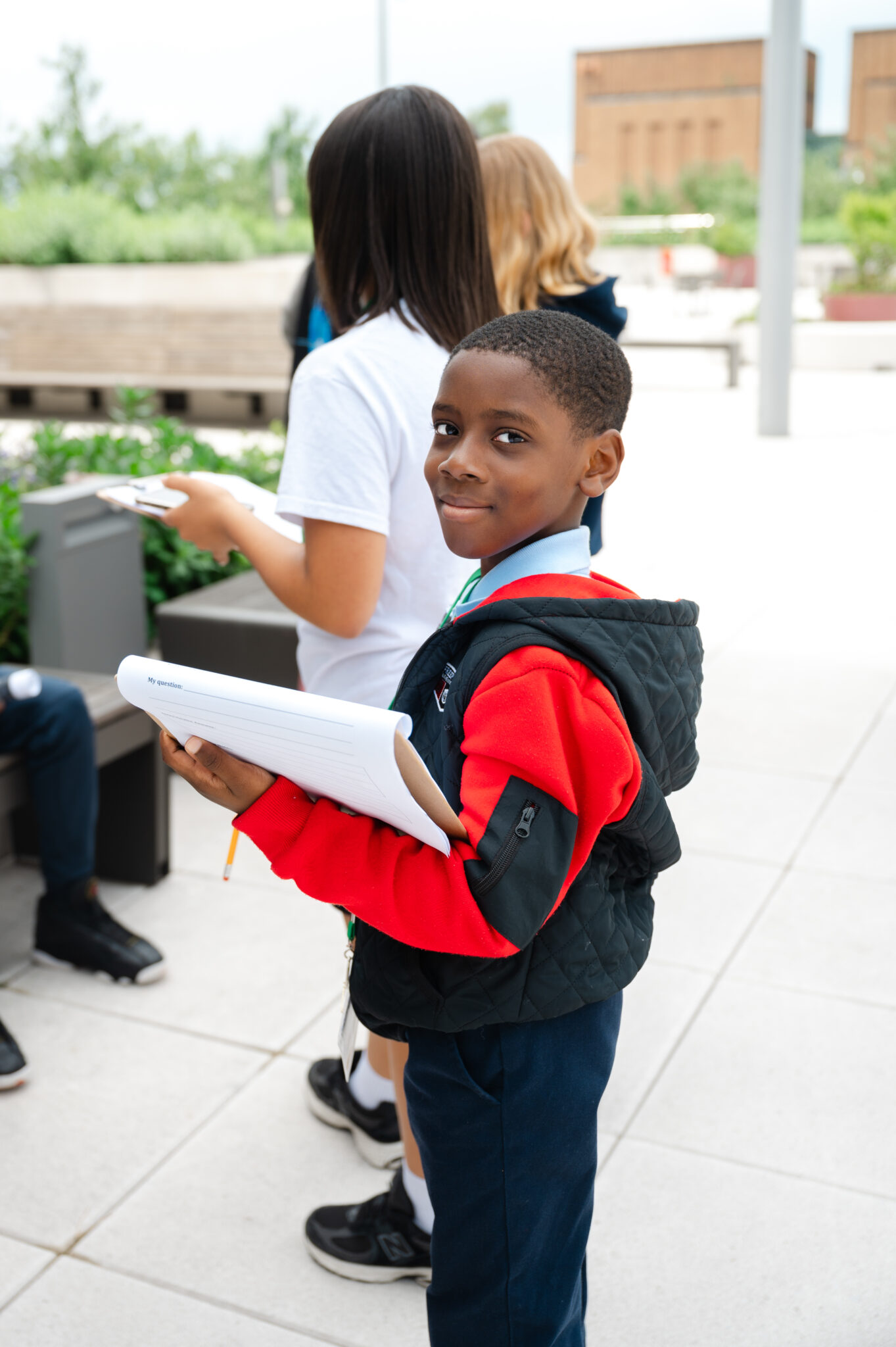
In the wake of our 13th Annual Discovering Sustainability Science Youth Conference, we’re turning our ears to the student journalists who reported live on the event as part of this year’s Youth Press Team! With so much climate education and sustainability science on stage, it was vital we captured the moment, and channeled the phenomenal energy of our partner schools through the lens of the students themselves.
This year, our Youth Press Team was nearly double the size of last year’s, with 13 young New Yorkers taking on the role of junior reporters and interviewing both their student peers and guest speakers about their research and work. Our student reporters ranged in age from 3rd grade to high school seniors, and created thoughtful journalistic articles summarizing their perspective on the conference. These experiences also included interviews with a few of our guest speakers, including Damali Wynter, Assistant Commissioner of the NYS Department of Agriculture and Markets, and Daniella Piper, the Executive Vice President and Chief Innovation Officer of New York Power Authority.
Thank you to Mariama, Basma, Yaleez, Juselys, Syeda, Jayden, Pharamond, Valentina, Jane, Matilda, Nilema, Cameron, and Aether for lending their voices to reporting at the conference. Click on each student’s name to check out their final works. A special thank you to Ms. Bobb, Ms. Larosa, Ms. Casimir, Ms. Rogers, Ms. Pinckney, Ms. Chan, and Ms. Giannella for helping support their students throughout the process!
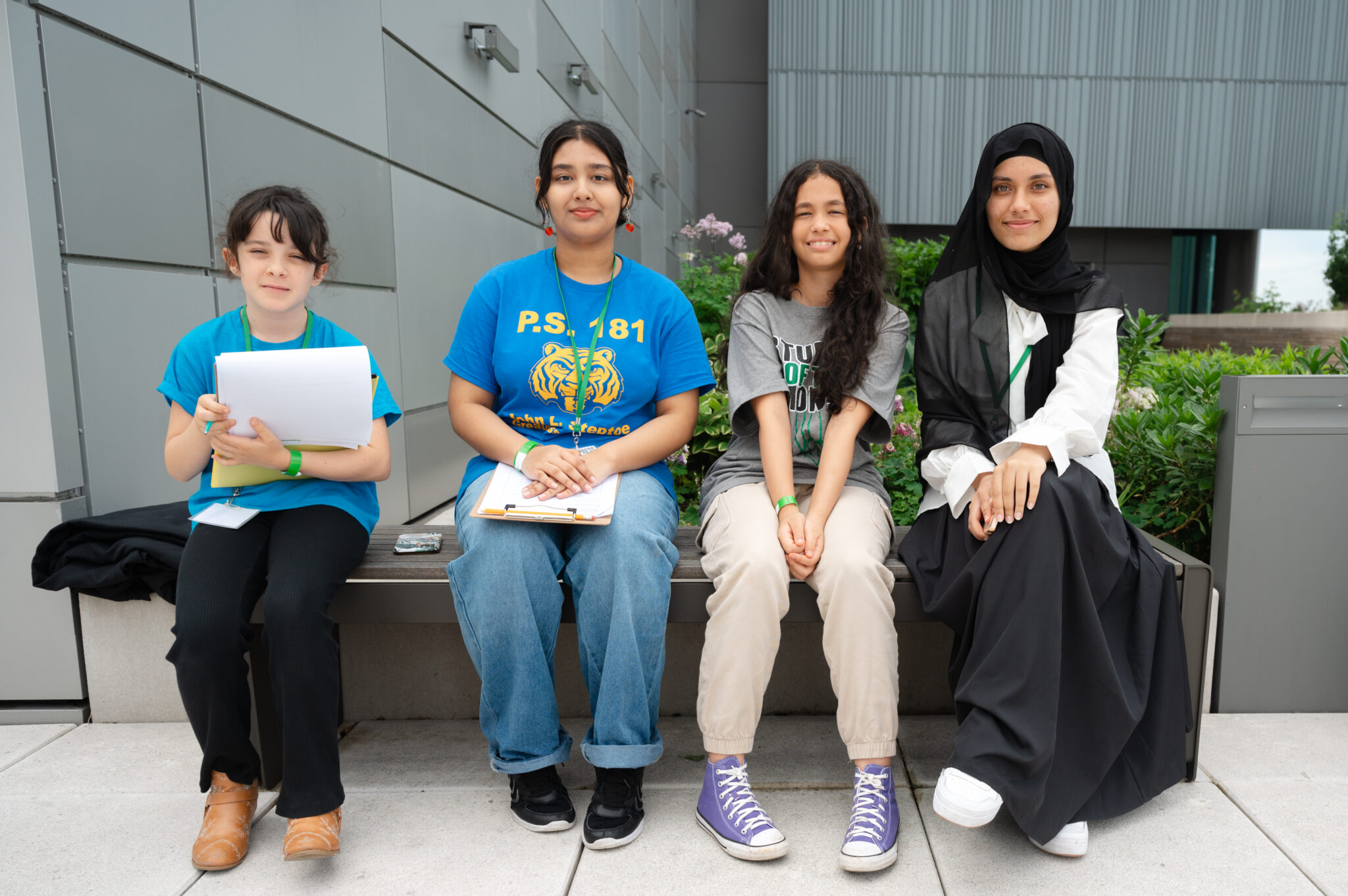
Blah
Harlem World: 1,000 NYC Students And Teachers Attend 13th Annual Discovering Sustainability Science Youth Conference
Blah
NY Hispano: Estudiantes y Maestros en la Conferencia de Sostenibilidad de NY Sun Works
Blah
The 13th Annual Discovering Sustainability Science Youth Conference is Here!
At the heart of every Youth Conference are, of course, the students! Last year, we watched a host of exciting presentations from students as young as 2nd grade, and as advanced as high school seniors, on subjects related to hydroponics, climate science, urban green space, and more! Our conference was split into three categories: students as Farmer Scientists and researchers; as innovators and engineers; and as global citizens and community leaders.
This year, we have another amazing lineup of student speakers from across the city who are sure to awe us with their scientific expertise. We’ll be sharing a livestream of portions of the event tomorrow morning, so be sure to follow us on Instagram for notifications about when we go live. But for those too eager to wait, some upcoming topics you can expect to hear about include the power of mushrooms, taking climate action through waste reduction, and exploring the powerful uses of hydroponically grown healing herbs!
Whether it means building their own hydroponic systems, growing crops in innovative ways, or researching how to do so more sustainably, students always bring creative and ambitious ideas to the table, and inspire us to dream big when it comes to climate action. In the meantime, feel free to check out some of last year’s student presentations on our YouTube Channel. We look forward to seeing all our school partners later this week at the beautiful Javits Center!


